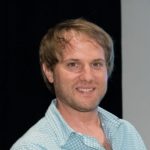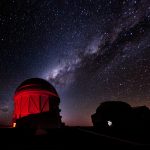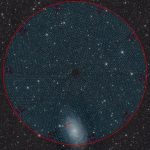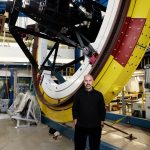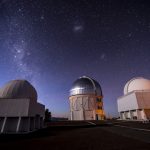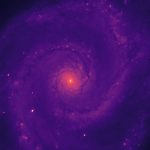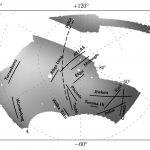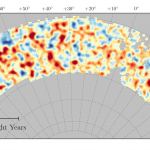The Fermilab Cosmic Physics Center is proud to welcome five new Fermilab Cosmic Physics Center Fellows. Profs. Kyle Dawson (University of Utah), Klaus Honscheid (Ohio State University), Paul Martini (Ohio State University), Marcelle Soares-Santos (University of Michigan) – Coordinated R&D for a Stage-5 Spectroscopic Facility Dr. Fernando Chierchie (CONICET, Universidad Nacional del Sur) – Readout… More »
dark energy
Fermilab Cosmic Physics Center scientist Guillermo Fernandez Moroni was awarded a DOE Early Career Research Award from the Office of High Energy Physics for “Demonstrating enabling technologies for a spectroscopy instrument for the next cosmic survey”. Congratulations Guillermo! To read more about the award see the Fermilab announcement webpage. More about the DOE Early Career… More »
The Dark Energy Survey (DES) released new results today using the largest ever sample of galaxies observed over an enormous piece of the sky to produce the most precise measurements of the universe’s composition and growth to date. DES scientists (include many scientists at Fermilab) measured that the way matter is distributed throughout the universe… More »
Join the CPC’s own theoretical physicist Dan Hooper as he joins with NYU PhD student Shalma Wegsman to answer some of the deepest questions about dark matter, black holes, quantum mechanics, and more. “Why this Universe?” is a new podcast that seeks to break down some of the biggest ideas in physics into easily digestible… More »
The Dark Energy Spectroscopic Instrument seeks to further our cosmic understanding by creating the largest 3-D map of galaxies to date. Below is a press release issued by Lawrence Berkeley National Laboratory announcing first light for this extraordinary instrument. The U.S. Department of Energy’s Fermi National Accelerator Laboratory is a key player in the construction of… More »
The Department of Energy has awarded Fermilab and University of Chicago scientist Josh Frieman $1 million over three years as part of the inaugural Office of Science Distinguished Scientist Fellowship program. Office of Science distinguished scientist fellows were chosen from nominations submitted by nine U.S. national laboratories. Frieman is one of only five scientists selected,… More »
Why is our universe accelerating in its expansion? If Einstein’s theory of general relativity is correct, then the dark energy that drives this expansion accounts for nearly 70% of the total energy in the universe. However, precise measurements of the history of this expansion may reveal that new dynamic forces are in play. The Dark… More »
The Dark Energy Spectroscopic Instrument seeks to further our cosmic understanding by creating the largest 3-D map of galaxies to date. Below is a press release issued by Lawrence Berkeley National Laboratory announcing first light for the optical lenses of this extraordinary instrument. The U.S. Department of Energy’s Fermi National Accelerator Laboratory is a key player in… More »
Also announces discovery of eleven stellar streams, evidence of small galaxies being eaten by the Milky Way At a special session held during the American Astronomical Society meeting in Washington, D.C., scientists on the Dark Energy Survey (DES) announced today the public release of their first three years of data. This first major release of… More »
New result rivals precision of cosmic microwave background measurements, supports view that dark matter and dark energy make up most of the cosmos Imagine planting a single seed and, with great precision, being able to predict the exact height of the tree that grows from it. Now imagine traveling to the future and snapping… More »











